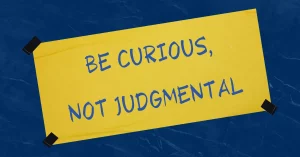
Curiosity: The Antidote to Certainty
Dès qu’on juge sans curiosité (« Ça ne marchera pas », « Il manque de leadership », « Je connais déjà la réponse », etc.),

This weekend, over coffee with a friend who is a manager of my age, I received a wake-up call. One of those that jolts you awake. We were talking about young people, the next generation... and, without really realizing it, we were rolling our eyes, sighing, and criticizing.
My 21-year-old son, sitting very close, listened in silence.
And then I understood: I too had fallen into the trap. I too had ended up labeling this famous Generation Y, and especially Generation Z. I, who at their age, had sworn that I would never become that old fool I denounced...
This tightness in my heart, this diffuse discomfort, has not left me. So I read. I listened. I observed. And, little by little, I understood something fundamental: these young people are not only contesting our methods – which, after all, is the role of every new generation – they are also reaching out to us.
They invite us to join them in a world they want to be fairer, more humane, more aligned. They want to be understood, integrated, respected. And not only do they deserve it — they are essential.
Because this youth is much more than our future. It is our chance. Our wake-up call. Our compass in an increasingly uncertain world.
Here is what I understood and what I would like to say to those who, like me, sometimes judge too quickly.
I admit it: I often thought that young people wanted everything right away, without really sweating. But with a bit of perspective, I see that it's not a refusal to work. It's a refusal to act without understanding.
What they are looking for is not a position, it is a cause. They want to know what it is for. Who it benefits. What it changes.
Our role, as leaders, is to put meaning back at the heart of our communications.
To link each action to a purpose.
Not just the 'how', but especially the 'why'.
2. They make the emotion legitimate.
I sometimes saw their emotional spontaneity as a lack of filter. Today, I see it differently.
They grew up in a world where naming their emotions is a strength, not a weakness. They master this language better than us from a very young age. And their embraced vulnerability paves the way for more human, more genuine relationships.
Our mission? To create spaces where this authenticity can exist without fear.
And to show, we too, that empathy is a strategic skill, not a luxury.
Yes, their phone is often in their hands. But it is not a toy. It is their tool, their link to the world, their leverage for performance.
They are digital natives. Their ability to learn quickly, to filter information, to adapt is astounding. And what if it wasn't a distraction... but a collective superpower?
Our role is not to hinder, but to guide.
To channel this digital ease towards ambitious projects.
Not to restrain it, but to amplify it.
I have already found them "impatient." But their desire to climb the ranks quickly does not come from an oversized ego. It comes from a need for immediate impact because it is necessary and time is running out.
They want to play a role, not just learn in silence. They want to try, make mistakes, start over, contribute.
So let's offer them projects, not just tasks.
Mentoring, not micromanaging.
Challenges that are appropriate for them, not passive waiting.
Some accuse them of 'jumping' from one job to another. But for them, loyalty to a company is only worthwhile if the company is loyal to its promises.
Their loyalty goes to transparency, justice, and respect. When these pillars falter, they leave. Out of consistency, not whim.
And what if, instead of judging them, we took it as a call to do better?
To build environments that make people want to stay, not out of fear of leaving... but out of conviction.
They do not compartmentalize their lives like we have. They want to be able to be themselves, both at the office and at home. And that sometimes throws us off.
But deep down, it's legitimate: why should we leave part of ourselves at the office door? What they are asking for is coherence, authenticity.
It is up to us to redefine balance: more flexibility, yes, but also more clarity.
And above all, an environment where one does not need to play a role to exist.
Generation Z (and a good part of Generation Y) does not just wait for its turn. It pushes us to evolve.
Listening to him is not giving in. It is understanding that the world is changing — and that these young people are its pioneers.
Celebrating this generation is much more than an HR issue. It is a noble leadership challenge. It is about choosing to enlighten, not to command. To inspire, not to impose.
And for me, as a parent, it is also a commitment of the heart: learning to see my children — and their entire generation — not as a mystery to solve, but as a potential unfolding before my eyes, an opportunity to seize.
Because deep down, they are not so different.
They simply want what they do to matter.
And that is exactly what we should want as well.
"It is the fever of youth that keeps the rest of the world at a normal temperature.
When the youth cools down, the rest of the world will be chattering their teeth."

Dès qu’on juge sans curiosité (« Ça ne marchera pas », « Il manque de leadership », « Je connais déjà la réponse », etc.),

Here is our top 10 list of reasons (out of 1000) why you should put on your "ugliest sweater" and show up at the party this year.

Here is our top 10 list of reasons (out of 1000) why you should put on your "ugliest sweater" and show up at the party this year.

If your flame feels extinguished and leadership has started to feel heavy, talk about it — with a coach, a mentor, or someone who can help you rekindle it.

Leadership research increasingly emphasizes a key competency: self-awareness. Daniel Goleman, an expert in emotional intelligence, highlights it as…

A handy and flexible tool to make your meetings more dynamic and engaging!
We look forward to hearing from you to learn how we can support you.